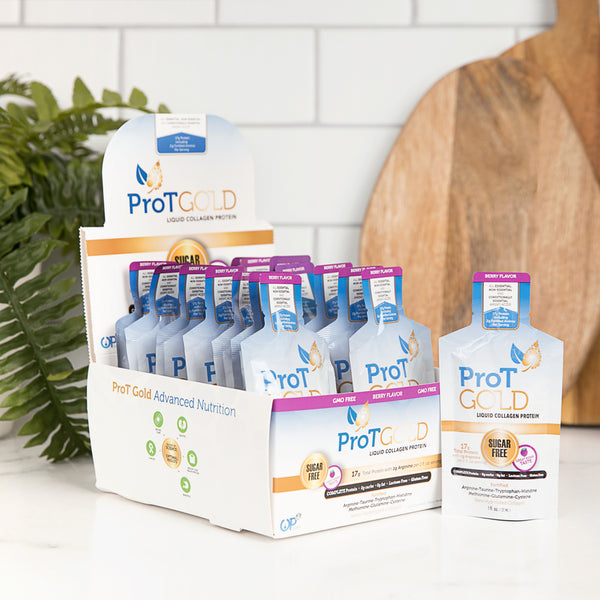Collagen for hair growth is becoming more and more popular for combatting hair loss. But what do studies say about the actual effectiveness of collagen for hair growth – and should you try it yourself?
Hair loss can show up in a variety of ways. Maybe your hairline looks different than you remember. Maybe you notice extra hair in your shower drain, vacuum cleaner, or even on your pillow in the morning.
Causes of hair loss can range from natural aging to illness and even stress! No matter why you’re experiencing hair loss, one thing is always the same: You want it to stop.
Losing your hair can be frustrating and can impact your self-esteem. But there’s no need to despair. There are many hair regrowth methods on the market today, and one of them is collagen.
But how does collagen help with hair growth, and how does hair growth work in the first place?
Let’s take a look.
How does hair growth work?
To find out how collagen for hair growth may help with hair loss, let’s take a look at how hair grows in the first place.
You might have heard that the visible hair on your head is made up of “dead” cells. This is half true, but the phrasing can be misleading.
After all, if it’s dead, how does hair grow?
Your hair starts beneath your skin, in the middle layer of skin tissue. This layer is called the “dermis,” and it’s where your hair follicles are.
Your hair follicles keep your hair anchored to your skin and attach to tiny blood vessels that keep hair growing through nutrients and hormones. The bulb of each follicle is fed by these blood vessels and creates living cells that divide to form your hair.
Once those living cells are formed in the bulb, they stick to each other and harden. As more of them build up, the hair is pushed out of your skin. This happens in millions of hair follicles all over your body!
So what is collagen, where is collagen found in the body, and how does collagen for hair growth factor in?
Collagen is the most common protein in the human body, and it’s found everywhere, from your blood veins to your skin cells and, of course, your hair. Collagen production and hair growth are connected in two ways: through the follicle in the dermis and through the cells in the hair itself.
Your hair follicles are in charge of making hair, but they don’t make hair 24/7. Even in people without hair loss, the body follows a hair growth cycle. Each follicle will grow for a period of a couple of months to several years, depending on where it’s at in the body.
After the growth phase, your hair follicles will be in a transitional phase. In this phase, the follicle and hair detach from the blood vessels and stop growing. This period lasts about 2 to 4 weeks, and then the hair falls out.
After the hair falls out, that follicle enters a resting phase. During the resting phase, cells slowly start to accumulate and create new hair. If you’re dealing with hair loss, your follicles are struggling with that hair creation process. But does collagen help with hair loss?
Where does collagen fit in?

7 science-backed reasons to take collagen for hair growth
Here are seven reasons you should try collagen supplementation for hair growth:
1. Collagen benefits your dermis
Your dermis, where your hair follicles are located, is made of about 70% collagen.
Unfortunately, your collagen levels naturally start depleting in your mid-20s, so to keep up with demand, you may need supplemental collagen for hair growth.
Ensuring your body has enough collagen means a healthier dermis. Healthier dermis layers mean your body can put that energy towards nourishing those follicles.
2. Collagen provides essential and non-essential amino acids
The second place you can find collagen benefits for hair is in the hair shaft itself.
Hair is mostly made up of keratin. Keratin is a protein made of 18 amino acids and collagen for hair growth contains some of those same amino acids.
Amino acids are the cellular “building blocks” your body uses to make proteins that hold your tissue (and hair) together. There are two kinds of amino acids: “essential” and “non-essential.”
Collagen contains mostly “non-essential” amino acids, but that doesn’t mean it isn’t essential for you. It just means that your body can rearrange other amino acids to create it, while essential amino acids cannot be created by your body and must be received through your diet.
Rearranging amino acids in your body to create collagen takes a lot of energy and materials. That’s why many people have found collagen for hair growth so helpful.
Think of it this way. You probably have the ingredients to make ice cream in your kitchen right now, but do you have the time and energy for it? Of course not. On top of that, you may not have quite enough of every ingredient. It’s much more convenient to grab the premade tub of ice cream!
When it comes to collagen for hair growth, the same thing applies. Your body can rearrange amino acids to form collagen and then rearrange that collagen to form keratin.
But that doesn’t mean that your body has the resources to do it right this very second, or that it can even make enough of it, which could be contributing to hair loss. That’s why collagen is one of the best supplements for hair loss.
3. Collagen reduces oxidative stress
Collagen peptides benefits have been observed by hundreds of people and have played a role in numerous lab studies. In one such lab trial, collagen has been shown to reduce oxidative stress.
“Oxidative stress” covers a wide range of external things that influence the health of your skin and hair, including sun damage, smoking, and poor diet. Oxidative stress directly damages protein, which is why the study used collagen to treat it.
Another lab-only study found that collagen is better than tea at providing antioxidants. These antioxidants helped reduce or reverse aging in the carp they treated with it. Now, fish don’t have hair, so it’s hard to say if collagen anti-aging benefits would extend to luscious human locks.
That’s where the last stage of research, called “clinical” research, comes in. Clinical trials are where scientists take things out of the lab and into people’s real lives. A clinical trial can take 10 years or more, depending on what the scientists are researching.
4. Collagen can reduce gray hair
Taking collagen for hair growth can also help improve your hair’s health. Collagen’s antioxidant properties may reduce grey hair since oxidative stress is one of the contributors to graying.
The scientific research on collagen’s effects on overall hair health is promising. One clinical study found significant hair growth in women who took a supplement containing collagen after experiencing hair loss.
5. Collagen supplementation can increase collagen production
There’s a specific type of cell, called a “fibroblast” that’s critical in producing collagen. Several studies have noticed that taking hydrolyzed collagen – such as collagen for hair growth – can increase the number of fibroblasts in your skin. This leads to overall healthier skin, nails, and hair.
6. Liquid collagen for hair growth is more effective than shampoos
Some shampoos, conditioners, or hair masks have collagen in them and claim to support hair growth. There’s just one problem: Your body can’t effectively process topical collagen.
Remember, collagen is produced and processed in the dermis, below the outer layer of skin. Putting collagen on the shaft of your hair means that the collagen will never get to your dermis. That means that even if your body absorbs some collagen, the protein will have little to no effect.
Using these shampoos and hair masks would be a little like rubbing ibuprofen on your forehead to cure a headache. Sure, that’s where the pain is and, yes, ibuprofen can help a headache, but that’s not how it works. You need to take collagen for hair growth internally so your body can process it.
Your body can’t process collagen through the hair shaft. If you want to see collagen benefits for hair, you’ll want to take supplemental liquid collagen for hair growth. This way, your body can actually use the collagen you’re giving it.
7. Collagen has full-body health benefits
Many people who start taking collagen for hair growth wonder, “How long does it take collagen supplements to work?”
That can depend on many different factors, including your age and other health conditions. But even if collagen for hair growth doesn’t provide immediate results, collagen benefits for women and men are huge.
People who regularly take collagen often observe healthier, brighter skin and strong, healthy nails.
People with joint pain find that collagen helps decrease their pain and increase flexibility.
People who are healing from illness or injury often find that collagen speeds up wound healing.
Anecdotal evidence for collagen is everywhere, especially in reviews for collagen products. The body of scientific research to support it is growing, too. That makes sense since taking collagen products gives your body the building blocks it needs to create strong, healthy hair.
The best liquid collagen for hair growth
When you’re looking for collagen for hair growth, the options can be overwhelming. Besides the dozens of options for liquid collagen, there are also powders, pills, ready-made shakes… the list goes on.
Not all collagen is created equal, and many collagen supplements have additives in them. This decreases the amount of actual collagen you get, which means you won’t get all of collagen’s benefits for hair.
So what should you look for in a collagen supplement?
Check the amount of collagen in your supplement
This is one of the biggest things to look for when buying liquid collagen for hair growth. As the benefits of collagen become more widely known, more and more people try to capitalize on collagen’s popularity – usually at the expense of the customer.
More and more studies are concluding that collagen helps hair growth. In a scientific study, the specific amounts required to produce a result are always measured. This way, they can be replicated both in the lab and out of it.
The problem is that not all sellers bother to check the amount of collagen required to produce a result. (Or worse, they don’t care.)
On average, it takes between 10 and 15 grams of collagen for a supplement to have a noticeable difference.
This means that any supplement marketing in “milligrams” (mg) probably isn’t going to do much for you. Collagen for hair growth might proudly proclaim that there are 3,000 MGs of collagen per serving, but that’s only 3 grams – about ¼ the amount you likely need to see notable results.
Choose hydrolyzed collagen
The next thing you need to pay attention to is whether your supplement is hydrolyzed or not. To “hydrolyze” means to break apart a molecule with water. Why does this matter in collagen for hair growth? And what is hydrolyzed collagen protein?
Protein (in any form) is a naturally large molecule. When you ingest a collagen protein, your body has to break it into smaller amino acids to use it. This takes time and energy, making “regular” protein a bit harder for your body to use.
While breaking down non-hydrolyzed collagen won’t hurt you, your body will take longer to absorb and use this kind of protein. This may also lead to feeling uncomfortably full, or make it so you can’t absorb much protein at all, so it goes to waste.
Hydrolyzed collagen protein breaks down the naturally occurring collagen into smaller amino acids. Your body can absorb and digest it much more quickly and easily this way.
Better yet, look for a nano-hydrolyzed collagen supplement that has gone through the process of hydrolysis more than once – so the molecules are broken down to less than 1% of their original size! These supplements are extremely easy for your body to absorb and utilize.

Look for naturally-sourced collagen
Finally, the source of collagen matters.
Collagen can only be sourced from animal tissue.
And, like with all animal-derived proteins, there’s a difference between grass-fed and grain-fed meat. That same difference applies to the collagen products you buy.
Grass-fed animals have meat that’s naturally higher in vitamins and minerals, with higher-quality protein. This translates into your collagen for hair growth because collagen is a protein.
When you’re looking for a supplement, check where they get their collagen from. The best collagen will come from grass-fed beef or wild-caught fish. If your supplement doesn’t say where the collagen comes from, it may be time to ditch it in favor of a higher-quality, more transparent option.
Grab a medical-grade collagen supplement
As mentioned above, most collagen supplements aren’t regulated by the FDA, but the exception to that is medical-grade collagen. Medical-grade supplements have undergone rigorous testing to ensure they are safe for consumption.
Not only are medical-grade collagen supplements FDA-regulated, but the production is also overseen by medical staff, so you know you are receiving a safe and top-quality product.
ProT Gold hydrolyzed collagen protein is both medical-grade and nano-hydrolyzed, so its trusted formula can be fully absorbed by your body in just 15 minutes or less.
If you’re looking for liquid collagen for hair growth, the convenient single-serve liquid collagen pouches from ProT Gold might just be the ticket.
